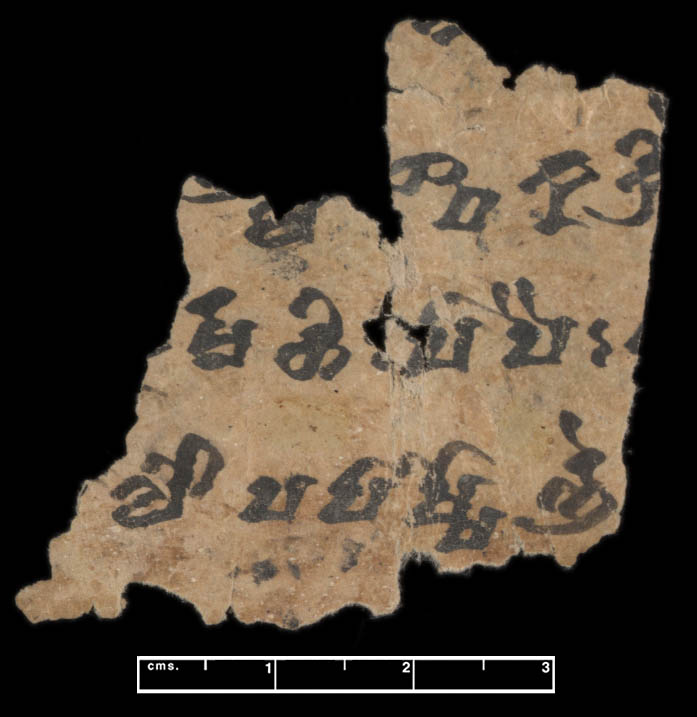Work in progress
IOL Toch 807
| Known as: | IOL Toch 807; Tb 110 |
|---|
| Cite this page as: | Michaël Peyrot. "IOL Toch 807". In A Comprehensive Edition of Tocharian Manuscripts (CEToM). Created and maintained by Melanie Malzahn, Martin Braun, Hannes A. Fellner, and Bernhard Koller. https://cetom.univie.ac.at/?m-ioltoch807 (accessed 12 Jul. 2025). |
|---|
Edition |
| Editor: | Michaël Peyrot |
|---|
Provenience |
| Main find spot: | Unknown |
|---|
| Collection: | British Library (London) |
|---|
Language and Script |
| Language: | Skt.; TB |
|---|
| Linguistic stage: | classical |
|---|
| Script: | classical |
|---|
Text contents |
| Title of the work: | Udānavarga |
|---|
| Passage: | 11.8-11.13b |
|---|
| Text genre: | Literary |
|---|
| Text subgenre: | Doctrine |
|---|
| Verse/Prose: | prose |
|---|
Object |
| Material: |
ink
on paper |
|---|
| Form: | Poṭhī |
|---|
| Size (h × w): | 4.4 × 4.7 cm |
|---|
| Number of lines: | 4 |
|---|
Images
Transliteration
| a1 | /// ·[n]· /// |
|---|
| a2 | /// [la]· l· s̝pa ka krau /// |
|---|
| a3 | /// [k]· rma bhi ḥ pā pai ḥ – /// |
|---|
| a4 | /// – lo pa pā ṣṣo rñe /// |
|---|
| b1 | /// wsā ññä ṣtra 10 sth· v· /// |
|---|
| b2 | /// : mo ha jī rṇa ḥ – /// |
|---|
| b3 | /// – tse • vi śre ṇa [y]· /// |
|---|
| b4 | /// • [a] – – /// |
|---|
Transcription
Translation
| a1 | ... |
|---|
| a2 | [TB] accumulated (rebirth) is sorrow, too |
|---|
| a3 | [SKT] because of their bad deeds (the bad) |
|---|
| a4 | [TB] (he who has excessively) bad morals |
|---|
| b1 | [TB] (like) [his] enemy wishes [to have] (him) [SKT] (one does not become) an elder (just because) |
|---|
| b2 | [SKT] (he is called) “pseudo-old” |
|---|
| b3 | [TB] (who has put aside [merit and evil], who leads the pure life) [SKT] (who goes) in dissociation |
|---|
| b4 | [SKT] [if] (one is telling lies) without restraint |
|---|
Commentary
Parallel texts
Remarks
| * | On IDP, recto and verso are reversed. |
|---|
Philological commentary
| n1 | Uv.11.8d duḥkhāś copacitā bhavāḥ. In the Tocharian translation, lä(k)l(e) 'sorrow' is singular, unlike Skt. duḥkhāś, which is plural. |
|---|
| n2 | Uv.11.9c pāpā hi karmabhiḥ pāpair |
|---|
| n3 | Uv.11.10a yo ’sāv atyantaduḥśīlaḥ |
|---|
| n5 | Uv.11.10d-11a yathainaṃ dviṣa-d icchati // 10 sthaviro na tāvatā bhavati |
|---|
| n6 | 10: something that might be the stroke of 11 is seen above, but we expect just 10 because pāda 11 follows. |
|---|
| n7 | Uv.11.11d mohajīrṇaḥ sa ucyate |
|---|
| n8 | Uv.11.12b-c prahāya brahmacaryavān / viśreṇayitvā carati |
|---|
| n9 | Uv.11.13b hy avṛtas tv anṛtaṃ vadan; the hiatus-resolving hy is lacking in this version (this occurs frequently with these pādas divided in two, because there is no hiatus anyway, cf. Thomas 1974: 82, Thomas 1977a: 271 and e.g. THT 101 a3 as(m)iṃ for hy asmiṃ). |
|---|
Linguistic commentary
| n4 | sāñ: a variant of sān, nom.sg. ‘enemy’, in sandhi before the following ñäṣträ. |
|---|
References
Online access
IDP: IOL Toch 807
Edition
Peyrot 2007: №807; Peyrot 2008a: 98
Bibliography
Bernhard 1965
Bernhard, Franz. 1965. Udānavarga. Band I, Einleitung, Beschreibung der Handschriften, Textausgabe, Bibliographie. Sanskrittexte aus den Turfanfunden 10. Göttingen: Vandenhoeck und Ruprecht.
Chakravarti 1930
Chakravarti, Niranjan Prasad. 1930. L‘Udānavarga sanskrit, Texte sanscrit en transcription, avec traduction et annotations, suivi d‘une étude critique et de planches. Tome premier (Chapitres I à XXI). Paris: Geuthner.
Hahn 2007
Hahn, Michael. 2007. Vom rechten Leben, Buddhistische Lehren aus Indien und Tibet, Aus dem Sanskrit und aus dem Tibetischen übersetzt und herausgegeben. Frankfurt am Main/Leipzig: Verlag der Weltreligionen (im Insel Verlag).
IDP
“The International Dunhuang Project: The Silk Road Online.” n.d. http://idp.bl.uk.
Peyrot 2007
Peyrot, Michaël. 2007. “An edition of the Tocharian fragments IOL Toch 1 – IOL Toch 822 in the India Office Library.” International Dunhuang Project. 2007. http://idp.bl.uk/database/oo_cat.a4d?shortref=Peyrot_2007.
Peyrot 2008a
Peyrot, Michaël. 2008a. “More Sanskrit – Tocharian B bilingual Udānavarga fragments.” Indogermanische Forschungen 113: 83–125.
Thomas 1974
Thomas, Werner. 1974. “Zu einigen weiteren sanskrit-tocharischen Udānavarga-Fragmenten.” Zeitschrift für Vergleichende Sprachforschung 88: 77–105.
Thomas 1977a
Thomas, Werner. 1977a. “Der tocharische Übersetzer und seine Zweifel an der eigenen Leistung.” Central Asiatic Journal 21: 259–94.




